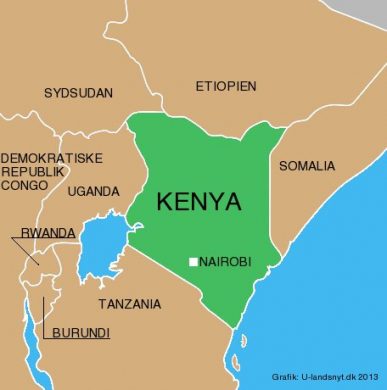Kenya er en etnisk krudttønde, hvilket de mange dræbte efter præsidentvalget i 2007 viste til fulde – nu er den gal oppe i det karrige nord, hvor stridigheder om de sparsomme naturressourcer og gamle modsætninger blusser op igen og igen – og nu mere end længe.
MOYALE, 11 December 2013 (IRIN): A fresh outbreak of violence between communities in northern Kenya’s Moyale area – in Marsabit County – has displaced tens of thousands and led the government to take the almost unprecedented step of deploying its troops domestically in an effort to quell the unrest.
The violence, which has broken out intermittently (med mellemrum) since late 2011, has paralysed business and transport activities.
The attacks have often been abrupt in nature, targeting people at work or who are travelling, according to a 9 December Kenya Red Cross Society (KRCS) update .
There have been incidents of roads being barricaded, as well. On 28 November, transport between Moyale and Nairobi was cut off after the road was blocked at the Turbi area for over 10 hours, notes KRCS.
What is the current humanitarian situation?
As of 11 December, at least 72.000 people in Moyale have been uprooted from their homes, according to KRCS.
The Kenyan Red Cross notes that about a third of the displaced families have crossed the border into Ethiopia, after violence left at least 30 people dead in the previous week.
“More than 10 settlements have been completely deserted. We found no single soul in all the areas hard-hit by the clashes. All families have left and fled,” Tom Omolo, KRCS’s regional disaster coordinator, told IRIN.
Some of the abandoned areas include the villages of Arosa, Butiye, Funanyata, Kote, Oda and Sololo.
Wario Lakicha, whose family is among those that have fled into Ethiopia, said:
“We are suffering. Nobody is helping us. In some cases, more than 30 people are sharing one house; a large number are being hosted by relatives.”
Also newly arrived in Ethiopia, Wario Golicha, who fled the village of Butiye, told IRIN that his family is living in a flimsy structure made of polythene (teltduge af plastic). For a toilet, the family is using the open fields.
“We have no water, no food, no blankets, mosquito nets or bed, and sleep in darkness. My children have no clothes – they left them all as we fled,” he said.
Houses burnt down
Several families have been camping at the Sololo Police Station, on the outskirts of Moyale town, since their houses were burned down.
Moyale town has also been affected, with transport paralysed a week after some vehicles there were torched (stukket i brand).
Abdi Wario, a Moyale trader, spoke of the hardships businesspeople are undergoing.
“No vehicle has left Moyale for a week now. Some retail traders (detailhandlende) have nothing to sell. In my case, I have a lot of goods to sell but no buyers,” he said.
Livestock trade in the predominantly pastoral area has similarly been affected.
A health worker in Moyale, who preferred anonymity, said he had fled work due to threats.
“Heath facilities have been closed. Health services has been disrupted and suspended in some areas because the nurses and clinical officers have also been affected by the conflicts and threatened,” he said.
Who is fighting whom?
Læs videre på
http://www.irinnews.org/report/99312/briefing-escalating-clashes-in-northern-kenya














